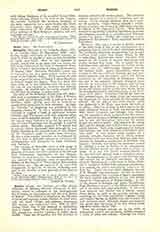

Bobadilla, NICOLAS, b. at Valencia, Spain, 1511; d. at Loretto, Italy, September 23, 1590. After having taught philosophy in his native country, he went to Paris to acquire a more perfect knowledge of Greek and Latin. Here he met Ignatius of Loyola, joined him in his plans and was among the first seven followers of the saint to consecrate themselves to God in the Society of Jesus, at Montmartre, August 15, 1534. Hereafter Bobadilla’s career was a very active one, as a most zealous worker in the cause of the Catholic Faith. While serving the sick in the camp of the army of Charles V about Ratisbon, he himself caught the plague. Here too, about this time, 1546, as he was returning from the camp into the city he was waylaid by assassins and severely wounded. At another time he barely escaped with his life from an attempt to poison him.
By order of the Sovereign Pontiff Paul III, Bobadilla took a prominent part in the Diets of Nuremberg, 1543, and of Speyer, 1543, as well as in that of Ratisbon, 1546. Shortly after this an incident occurred which forced him to leave Germany. In 1548, the “Interim” of Augsburg was published by the Emperor, Charles V. It was a tentative document intended to suggest a basis of agreement between Catholics and Protestants until their religious differences could be definitely settled. But as it seemed in the eyes of many Catholics to go too far, and in the eyes of many Protestants not far enough, it satisfied neither party. Bobadilla opposed it in speech and in writing, and so vigorously, that although he was highly esteemed in the imperial court, he was obliged, by the Emperor’s order, to retire from Germany. He was a most popular preacher, as is evidenced by the fact that he delivered sermons in seventy-seven archbishoprics and bishoprics in Italy, Germany, and Dalmatia.
The writings of Bobadilla cover a wide range of topics. Among them are commentaries on some chapters of Genesis and other portions of the Old and New Testaments; annotations on the Gospels; treatises on predestination, the sacraments and their use, against the Lutherans, cases of conscience; a defense of the Council of Trent against Melanchthon and Calvin, etc. The last survivor of the seven first companions of Ignatius of Loyola, Bobadilla took part in the election of four generals of the Society of Jesus.
JOSEPH M. WOODS.

